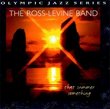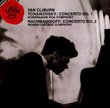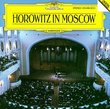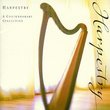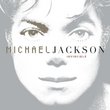| All Artists: Ludwig van Beethoven, Vladimir Horowitz Title: Vladimir Horowitz, Complete Masterworks Recordings 1962-1973, Vol. VI: Horowitz Performs Beethoven Members Wishing: 0 Total Copies: 0 Label: Sony Original Release Date: 1/1/1994 Re-Release Date: 6/14/1994 Genre: Classical Styles: Forms & Genres, Sonatas, Historical Periods, Classical (c.1770-1830), Modern, 20th, & 21st Century, Romantic (c.1820-1910) Number of Discs: 1 SwapaCD Credits: 1 UPC: 074645346724 |
Search - Ludwig van Beethoven, Vladimir Horowitz :: Vladimir Horowitz, Complete Masterworks Recordings 1962-1973, Vol. VI: Horowitz Performs Beethoven
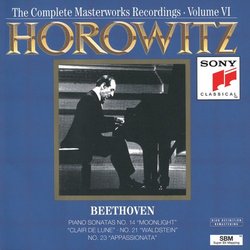 | Ludwig van Beethoven, Vladimir Horowitz Vladimir Horowitz, Complete Masterworks Recordings 1962-1973, Vol. VI: Horowitz Performs Beethoven Genre: Classical
|
Larger Image |
CD DetailsSimilar CDs
Similarly Requested CDs
|
CD ReviewsClose, but no Cigar Hank Drake | Cleveland, OH United States | 03/18/2003 (4 out of 5 stars) "Volume Six of Vladimir Horowitz's complete Columbia Recordings features the legendary pianist in three popular Beethoven sonatas. It's no secret that Horowitz did not care for Beethoven's clumsy piano writing, was not regarded as a great Beethoven interpreter, and recorded these sonatas merely to satisfy contractual obligations. Though these sonatas were recorded in 1972 and 1973, Horowitz never played these particular works in public after 1953. Record company executives were the bane of Horowitz's existence until very late in his career, when he had attained so much notoriety that he could "record the C major scale and it would sell" in the words of Thomas Frost. This is Horowitz's third recording of the de-rigeur Moonlight. As a performance, it is smoothed out and uneventful, slick and modern--even cold. The triplets of the opening movement lope along without having much meaning invested in them (a far cry from Horowitz's 1956 recording of the work which, despite its poor sonics, remains a benchmark in Beethoven performances). The Allegretto has some nice voicing, but the Finale's sudden accents are ignored, robbing the movement of much of its drama. One can admire the clarity of the playing here, as well as the technical finesse and excellent recorded sound, but Horowitz's heart is clearly not in this performance. Horowitz's recording of the Waldstein Sonata in C major, Op.53, alternately delights and distracts. The clarity of the outer movements is remarkable, as is the unique kinetic energy. But, his feminine way of phrasing the first movement's second theme, beautifully voiced as it is, is especially foreign to Beethoven's masculine approach. The trills which accompany the main theme in the last movement are uncannily balanced, but purists will also be annoyed by Horowitz's rewriting of the finale's coda: where Beethoven has written octave glissandi, Horowitz substitutes octaves played presto and staccato. It has been speculated elsewhere that Horowitz considered the octave glissandi unplayable on the modern piano. Nonsense, I've played it as written myself, and so have many fellow pianists. Horowitz simply did not like the way Beethoven's writing sounded, so he changed it. Still, it cannot be said that this performances are boring (he's way ahead of Rubinstein's 1954 performance, which drags in the finale), and in today's homogenized pianistic culture, that alone is adequate recommendation. Horowitz was more attuned to the bravura Sonata in F minor, Op. 57, the popular Appassionata. This 1972 recording is more successful than his more somber 1959 version. Horowitz allows more of his inate theatricality to come through, thereby increasing the drama of the piece. He also resists the temptation to stress the odd phrase for effect, at the expense of the whole, thereby increasing the structural cohesiveness. Especially noteworthy is the finale, taken at an unhurried tempo (it's actually easier to rush this movement), with virtually no pedal, but with overwhelming effect. Truly a triumph of the will over the limits of the flesh. Sony has adequately remastered the sound, which is more full bodied than before, but remains rather dry." HE'S GREAT, BUT........ DAVID BRYSON | Glossop Derbyshire England | 09/26/2001 (3 out of 5 stars) "I'm an outright devotee of Horowitz, and I can rave with the best about much of his Chopin, Liszt, Rachmaninoff, Schumann, Brahms, Scriabin, Scarlatti and whatnot (especially whatnot). However I just have to risk spoiling the party here and issue a slight warning to Beethoven-lovers who might want to get these performances unheard on the strength of the unanimous enthusiasm in the other reviews. To get his Moonlight into perspective you just have to compare the performance by his great friend Rudolf Serkin, who was the real thing as a Beethoven interpreter. Tempi are very similar, particularly in the last movement, where not many have the steel fingers to attempt this kind of reading. But where Serkin is epic and menacing Horowitz just sounds angry. By comparison -- dare I say it -- he is a bit lightweight. And you do not have to be much of a purist to object quite strongly to the outright solecism at the end of the Waldstein, where he he bumps out the glissandos as separate notes -- what got into him? Again in the middle of the first movement of the Appassionata there is a thunderous fortissimo sequence followed by an abrupt pianissimo on the first beat of the bar. The effect is almost impossible to bring off exactly as written. Serkin can't quite do it: Richter actually does achieve it, though at the cost of a lot of liberty with the tempo and I suspect also some conniving with the recording engineers. Horowitz has his own solution -- he gives the first beat a resounding thwack and drops to pianissimo on the second. I say again I am a major fan of Horowitz, but I find him resistable in Beethoven." The Best Beethoven Michael B. Richman | Portland, Maine USA | 11/13/2000 (5 out of 5 stars) "When I purchased Vladimir Horowitz's 13-disc "Complete Masterworks Recordings," I considered "Volume VI - Horowitz Performs Beethoven" to be a bonus. Of the nine CD volumes collected in the box set, the only one I already owned was "Volume 2 - The Celebrated Scarlatti Recordings," but I already had all three of the sonatas (Nos. 14, 21 & 23) featured on Volume VI on albums by other artists. I already had a "Moonlight" Sonata recording by Wilhelm Kempff, a "Waldstein" Sonata recording by Maurizio Pollini, and a "Appassionata" Sonata recording by Horowitz himself on RCA Living Stereo. Since I already loved the three performances listed previously, I figured I would use this disc as a nice comparison piece. Well, months later the Horowitz's "Volume VI" is the only one I come back to for repeated listenings. Horowitz's versions are simply magical, and he even outdoes his own earlier recording on RCA because his playing style seems wiser and more thoughtful. For a disc that I originally thought would simply be an extra in my collection, this one ended up being a favorite."
|

 Track Listings (9) - Disc #1
Track Listings (9) - Disc #1
